Cablemod came out hard and strong mid Dec last year with a relatively large line up of aftermarket individually sleeved cables for 3 PSU brands and 10 PSU lines (Corsair AXi/HXi/RM, EVGA G2/P2/T2 and Seasonic XP2/XP3/KM3/FL2). By now you may even have seen videos from OC3D and HardwareCanucks about them. Thanks to the Cablemod community manager, I got a chance to take a look at one of their kits. I chose the E2 set in red to compare with the EVGA kit I checked out last year here: http://linustechtips.com/main/topic/179218-evga-g2p2t2-individually-sleeved-cable-kit/
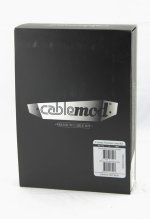
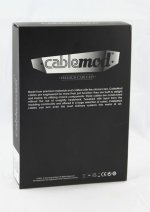
The outer cover is pretty clean and gives you the brand name as well as the series name and color type, along with the UPC/EAN codes. I must note here that this is a sample set and not a retail kit. Retail versions will have the box sealed in plastic and each cable will also be sealed in a plastic pouch instead of being tied in place using cable ties. A retail set will be coming to my hands at a later point and I will be sure to point out any difference(s) I spot then.
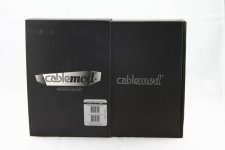
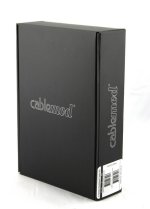
Sliding out the cover reveals the box that contains everything.

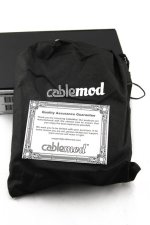

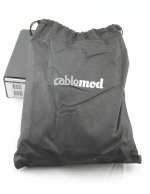
Opening it up, you are greeted by a drawstring pouch bag and a certificate of assurance below it. While I have yet to hear any reports of aftermarket cables from a half decent brand going bad, it is always good to see this- especially after seeing first hand the level of involvement that the Cablemod team does in various online communities and across social media platforms. Some would say this is something to be expected from a start-up brand and I would agree, so here's to hoping the same level of commitment stays with time and success.
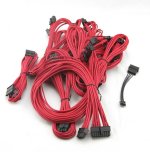
Opening up the pouch, we see a heap of cables and...

This thing. I understand that Cablemod was referencing the stock cables provided with the PSU(s) when making their own cables but this just seems so out of place here. Anyone with an EVGA G2/P2/T2 PSU will have one of these anyway so I am a bit indifferent to the inclusion of this as-is. Either sleeve it, or omit it fully. But then again, it is a small molex-floppy drive adapter that one can just put back in the pouch with any unused cables so I will stop making a mountain out of a mole hill here.
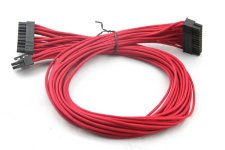
Now we come to why I felt that adapter was so out of place. I wish I could actually show properly how the sleeving felt because these cables are proper paracord and feel great compared to any of the nylon/microcord cables I have handled before. This 20+4 pin cable comes in at 60 cm long- same as the stock EVGA ATX cable as well as their own individually sleeved ATX cable. In fact, this is the same story for all common cables used and thus helps remove any surprises of cables being too short/long.
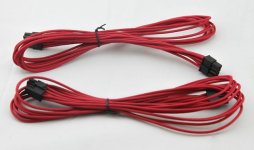
Now for the EPS cables. There are 2 4+4 CPU power cables which are both 70 cm long. Notice there isn't any indicator to distinguish these from the PCI-E cables. This is something I would like to see implemented in the next revision just to cater to everyone. In the meantime, to distinguish these from the PCI-E cables, just remember that the latter come in 6+2 type (or just 6 pin):
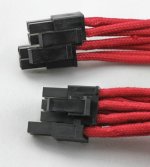
Going back to the EPS cables, I noticed they implemented an interlocking connector for the 4+4 pins:
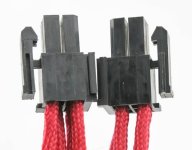
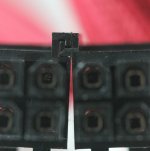
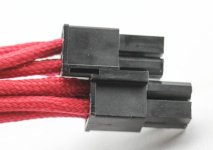
This is not a unique connector to them but again another example of a small thing that can help out end users and one that isn't commonly used.
Now on to the PCI-E cables:
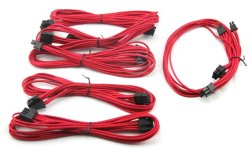
There are 4 6+2 pin cables that are 60 cm long and 2 daisychained dual 6+2 pin cables that extend to 75 cm long for the additional connector. As usual- these are ok if sticking close to the theoretical PCI-E power limits (150w for 8 pin, 75w for 6 pin) but I recommend using discrete cables if overvolting/overclocking past these power delivery limits.
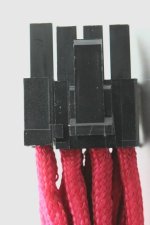
The 2 pin part just clips on and does not interlock, and is also separated right at the PSU side itself just as with the EVGA individually sleeved kit. This way you can hide it completely if not needed.
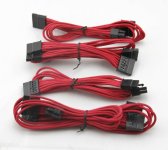
There are 2 4x SATA cables (one 85 cm long and the other 70 cm long) and 2 2x SATA cables (50 cm long). I liked this a lot since this caters to people with large and small cases and also helps power storage drives as well as other accessories that use SATA for power without feeling like you are running out of options.
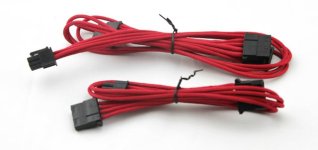
On the full size Molex end, you are more limited. What's included is a 3 Molex cable (75 cm long) and a 2 Molex cable (50 cm long). To be frank, I would like to see everyone migrate from Molex to SATA anyway so I am all for it personally. But I can see how people with pumps/fan controllers/LEDs might want to get more- not in terms of the number of connectors but more so in terms of cables themselves to route to different places. I can't fault them for this much though since the EVGA kit itself has the same configuration.
Now speaking of the EVGA cables,
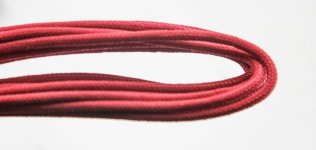
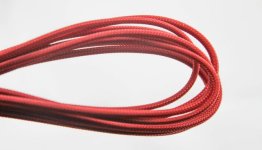
These paracord sleeved cables are softer and bend to a tigher radius (top) compared to the EVGA cables (bottom).
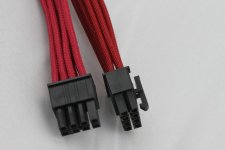
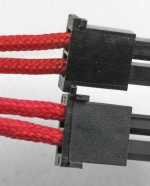
Both are heatshrink-less and the wires are crimped into the connector rather than being flame sealed. I didn't find any loose wires after a tug of each cable but time will tell how well they last.
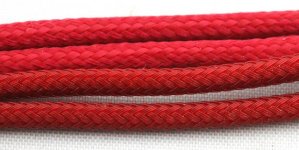
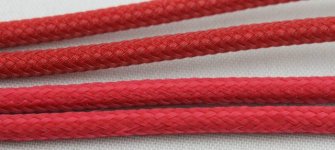
Excuse the order being swapped around in these two pictures, but you can see the Cablemod cables have a lighter shade of red compared to the EVGA ones. This is completely a personal thing and both go great with the Asus ROG red in the two Asus boards I have here.
One specific thing about these cables for the EVGA PSUs- the stock cables have capacitors on some of them to help lower the ripples further. But neither these nor the EVGA individually sleeved kit has them. EVGA said it matters very little and I have not found any differences when hooking these up to my EVGA PSUs to power a hungry rig, so I can definitely recommend these without issues.
Would I buy these? Currently, they are going for $89.95 over in the USA. The EVGA kit is also the same price. In the UK, things are a bit different in that the EVGA cables aren't easy to find and OcUK stocks the Cablemod ones for £70 w/VAT. Customer support from both companies is excellent as well- at least in the US. So it comes down to the actual cables themselves and I truly feel these cables are on a higher quality tier. So yes, I would buy these if I was looking for aftermarket cables.
[Addendum] I will have a professional sleever take a look at one of these cables and also de-pin them for pictures of the actual sleeving/crimping quality. I will also see how these work out in a large case as well as a small case. These pictures and thoughts will be added in soon.


The outer cover is pretty clean and gives you the brand name as well as the series name and color type, along with the UPC/EAN codes. I must note here that this is a sample set and not a retail kit. Retail versions will have the box sealed in plastic and each cable will also be sealed in a plastic pouch instead of being tied in place using cable ties. A retail set will be coming to my hands at a later point and I will be sure to point out any difference(s) I spot then.


Sliding out the cover reveals the box that contains everything.




Opening it up, you are greeted by a drawstring pouch bag and a certificate of assurance below it. While I have yet to hear any reports of aftermarket cables from a half decent brand going bad, it is always good to see this- especially after seeing first hand the level of involvement that the Cablemod team does in various online communities and across social media platforms. Some would say this is something to be expected from a start-up brand and I would agree, so here's to hoping the same level of commitment stays with time and success.

Opening up the pouch, we see a heap of cables and...

This thing. I understand that Cablemod was referencing the stock cables provided with the PSU(s) when making their own cables but this just seems so out of place here. Anyone with an EVGA G2/P2/T2 PSU will have one of these anyway so I am a bit indifferent to the inclusion of this as-is. Either sleeve it, or omit it fully. But then again, it is a small molex-floppy drive adapter that one can just put back in the pouch with any unused cables so I will stop making a mountain out of a mole hill here.

Now we come to why I felt that adapter was so out of place. I wish I could actually show properly how the sleeving felt because these cables are proper paracord and feel great compared to any of the nylon/microcord cables I have handled before. This 20+4 pin cable comes in at 60 cm long- same as the stock EVGA ATX cable as well as their own individually sleeved ATX cable. In fact, this is the same story for all common cables used and thus helps remove any surprises of cables being too short/long.

Now for the EPS cables. There are 2 4+4 CPU power cables which are both 70 cm long. Notice there isn't any indicator to distinguish these from the PCI-E cables. This is something I would like to see implemented in the next revision just to cater to everyone. In the meantime, to distinguish these from the PCI-E cables, just remember that the latter come in 6+2 type (or just 6 pin):

Going back to the EPS cables, I noticed they implemented an interlocking connector for the 4+4 pins:



This is not a unique connector to them but again another example of a small thing that can help out end users and one that isn't commonly used.
Now on to the PCI-E cables:

There are 4 6+2 pin cables that are 60 cm long and 2 daisychained dual 6+2 pin cables that extend to 75 cm long for the additional connector. As usual- these are ok if sticking close to the theoretical PCI-E power limits (150w for 8 pin, 75w for 6 pin) but I recommend using discrete cables if overvolting/overclocking past these power delivery limits.

The 2 pin part just clips on and does not interlock, and is also separated right at the PSU side itself just as with the EVGA individually sleeved kit. This way you can hide it completely if not needed.

There are 2 4x SATA cables (one 85 cm long and the other 70 cm long) and 2 2x SATA cables (50 cm long). I liked this a lot since this caters to people with large and small cases and also helps power storage drives as well as other accessories that use SATA for power without feeling like you are running out of options.

On the full size Molex end, you are more limited. What's included is a 3 Molex cable (75 cm long) and a 2 Molex cable (50 cm long). To be frank, I would like to see everyone migrate from Molex to SATA anyway so I am all for it personally. But I can see how people with pumps/fan controllers/LEDs might want to get more- not in terms of the number of connectors but more so in terms of cables themselves to route to different places. I can't fault them for this much though since the EVGA kit itself has the same configuration.
Now speaking of the EVGA cables,


These paracord sleeved cables are softer and bend to a tigher radius (top) compared to the EVGA cables (bottom).


Both are heatshrink-less and the wires are crimped into the connector rather than being flame sealed. I didn't find any loose wires after a tug of each cable but time will tell how well they last.


Excuse the order being swapped around in these two pictures, but you can see the Cablemod cables have a lighter shade of red compared to the EVGA ones. This is completely a personal thing and both go great with the Asus ROG red in the two Asus boards I have here.
One specific thing about these cables for the EVGA PSUs- the stock cables have capacitors on some of them to help lower the ripples further. But neither these nor the EVGA individually sleeved kit has them. EVGA said it matters very little and I have not found any differences when hooking these up to my EVGA PSUs to power a hungry rig, so I can definitely recommend these without issues.
Would I buy these? Currently, they are going for $89.95 over in the USA. The EVGA kit is also the same price. In the UK, things are a bit different in that the EVGA cables aren't easy to find and OcUK stocks the Cablemod ones for £70 w/VAT. Customer support from both companies is excellent as well- at least in the US. So it comes down to the actual cables themselves and I truly feel these cables are on a higher quality tier. So yes, I would buy these if I was looking for aftermarket cables.
[Addendum] I will have a professional sleever take a look at one of these cables and also de-pin them for pictures of the actual sleeving/crimping quality. I will also see how these work out in a large case as well as a small case. These pictures and thoughts will be added in soon.

